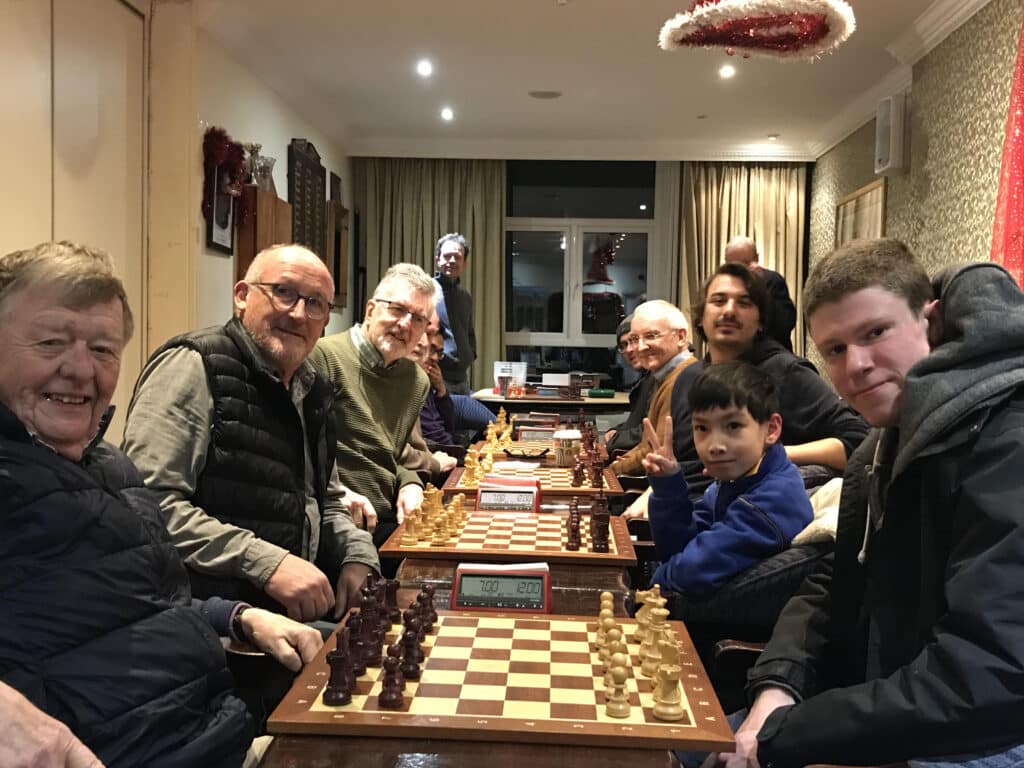Then, in 1974, after a year or two of “office chess” and in need of new opponents, I looked for a chess club to join in our area—and found none. That was when I decided to start a club locally. Quite by chance I discovered there had been a previous incarnation of a club in Dalkey. I never found out where it met, but I traced it back to a man called Fintan Delaney of Ardbrugh Road, Dalkey. By that time Fintan had passed away, but his brother still had some of the sets and boards—antiquated clocks, some of which worked again after oiling and gentle handling—and a few books, including a classic on the endgame. In those days, equipment was relatively expensive, so these relics were a godsend.
Endowed with this second-hand kit (and some gear I had bought myself), I searched for suitable premises. Eventually, through the kindly offices of the well-disposed Parish Priest, Fr Meagher, we were granted a comfortable room in Our Lady’s Hall in the centre of Dalkey village. This was to be our home for a number of years.
Some of the earliest members were Liam Hearns, and the very young John Lane (age 10) and his brother Conor (age 8)—who, between them, have become the club’s longest-serving members and are rightly due long-service medals. For the first year or so, the new Dalkey Chess Club played only amongst ourselves. Gradually, however, we realised that proper clubs played inter-club competitions. One of us, Padraic O Tuathaill, was also a member of Eoghan Ruadh, and he arranged for Dalkey to play one of their teams. To us novices, this was “the big time.” Astonishingly, we won narrowly—Padraic’s board victories proving decisive—and so we thought we might face league chess with some optimism.
Soon after came Jack Parker, rated over 1700, whom we revered as our resident Bobby Fischer. In those smoky days, he led us resolutely up through the league divisions, board 1 always aflame with cigarillo smoke and tenacious play.
Jim Walsh, chess correspondent of the Irish Times and former Irish international, was very helpful in these early years. He included Dalkey Chess Club notices in his much-cherished column and even performed simultaneous exhibitions against our members and visitors. His support helped to generate further interest in our club, and within three or four years, membership grew substantially—drawing players from well beyond Dalkey itself.
Other early stalwarts I recall include Seamus Duffy, Guy Lyons, Peter Cafolla, Eoghan Ó Bradaigh, Billy Cripps, Wally Sheridan, Dick and Paul Ivory, Briain Macaba, Arthur Rankin, Mr Pugh, Robin Knox and the redoubtable Phil Smith.
By then we fielded three or four league teams. Some felt Dalkey was not the best location—small catchment area, limited transport. Robin Knox offered his games-room in Deansgrange, but most members preferred to stay in Dalkey. After a while, Robin and a few others left to form Deansgrange Chess Club, which prospered for several years until Robin’s untimely death.
Our Lady’s Hall proved pleasant but had a noisy youth hall at the rear. Visitors complained of blaring music, so we moved across the road to St Lawrence’s Hall (behind Hick’s shop). It was quiet but cold—and when full of focused players, condensation dripped from its glass roof onto boards and clocks, which was less than ideal. With no better venue in Dalkey, we looked further afield and settled at the Boylan Community Centre in Suffolk Street, Dún Laoghaire.
As we remained in Dún Laoghaire, it made sense to change our name. Dalkey Chess Club thus became Dún Laoghaire Chess Club.
It may be noted there were originally no women listed among early members. In about 1985 I wrote a Southside newspaper piece inviting lady members; the next week eight women arrived but within two months only one, Lorna, remained. Maybe a new crusade would succeed today, as there are now many strong female players across Ireland.
Phil Smith, manager of the Dún Laoghaire Workmen’s Club at 19 Lower Georges Street, then offered us use of a large room in the Workmen’s. For several years we operated in that chalk-dusty billiard-hall atmosphere. Some patrons looked askance at nerdy chess players chalking cues and blackboards, but the nerds did well: by then, under Phil’s managerial energy and reverence for the game, we had been promoted to the top flight of Leinster chess leagues, the Armstrong Cup. Phil’s apartment just inside the hall door served as an open doorway for members to discuss tactics and borrow from his ample chess library.
